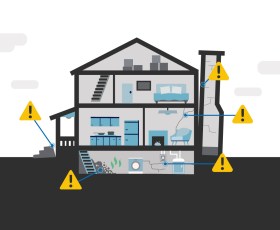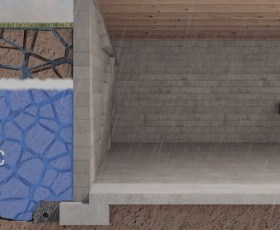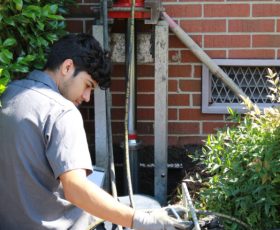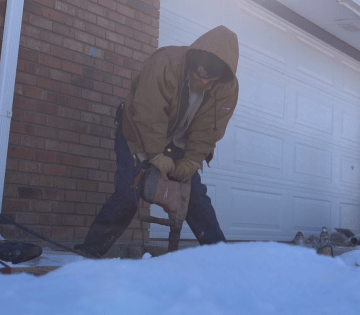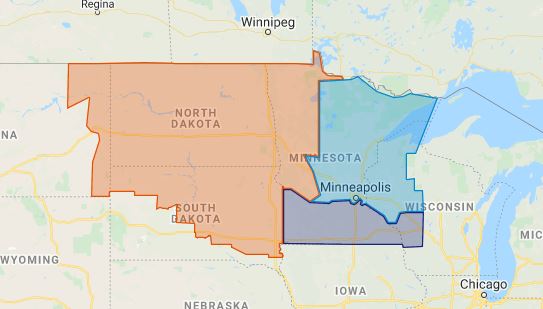Problem Signs
Do you notice any of the following signs and symptoms throughout your home? If so, you’ve got a problematic foundation on your hands. Click on the images to learn more about the cause of your foundation issue and our solutions.
Innovative Basement Authority

Bowing Walls
Foundation walls move inward primarily due to expansive soils and hydrostatic pressure on the walls from outside. However, foundation walls may also crack due to many other outside causes, including foundation settlement.
Innovative Basement Authority

Failing Retaining Walls
Failing retaining walls pose a danger to your property and wellbeing; repairing them need not be an overwhelming problem, however.
Innovative Basement Authority

Sticking Windows & Doors
Jamming, sticking, and difficult to open windows and doors may not have anything to do with the condition of these features. There could be deeper foundation issues leading to these problems.
Innovative Basement Authority

Wall Crack
Foundation wall cracks not only make your home look bad, but they also affect the structural integrity of your house and the safety of your family. Learn more about identifying the cause of your foundation wall cracks and how to repair them.
Causes
Whether your home has a slab foundation or concrete block walls in a crawl space or basement, the soil is going to impact your living environment in some way. Here are just a few ways soil affects your home.
Once your home’s foundation was completed, previously excavated dirt is replaced or backfilled around the walls. This “fluffed up” soil is loose, more aerated, and not as dense or tightly packed as undisturbed soil farther away from the house. This looser soil tends to absorb water easier than compacted soil. So, when water collects in the soil immediately surrounding the home it creates a “clay bowl.” The saturated soil expands and puts pressure, known as hydrostatic pressure, on foundation walls. When this constant pressure becomes more than the walls can bear, they will begin to show signs of failure in the form of cracks and inward movement.
It is natural for soil around your home, especially the backfilled soil, to settle into place over time. But it can settle at an angle and slope towards your foundation walls. This can contribute to the clay bowl effect and hydrostatic pressure, as well as the associated water seepage and wall cracks. The soil also could settle unevenly and lead the structure to do the same. When this happens, you’ll see diagonal wall cracks around windows and doors, and these windows and doors could become difficult to operate.
If you have a fireplace, you’ll need to pay close attention to the exterior chimney. A more dramatic sign of foundation problems and settlement is a failing chimney. Chimneys aren’t always built on the same soil as the house, and they could lack proper footing. When the soil underneath the chimney can no longer support the chimney or its weight, the chimney will start to crack and pull away from the rest of the house.
Water can enter through porous block walls and wall cracks, but another way it can seep inside and wreak havoc on your living environment is through open crawl space vents. Any water and moisture in an unsealed dirt crawl space spells trouble in a lot of ways. Something that will take a big hit is your home’s structural support system. Saturated wooden supports can rot and buckle, and metal supports can rust and corrode. This can then cause sagging, soft floors and floor joists, as well as contribute to problems with hardwood flooring.
Solutions
Now that you’re armed with more foundation facts, do you feel motivated and ready to take back your home with needed repairs?
Innovative Basement Authority

Channel Anchor
A bowing or tilting wall is alarming, channel anchors stabilize even extremely damaged walls.
Innovative Basement Authority

Crawl Space Support Posts
The IntelliJack™ system provides solid support for sagging and undersized beams, restoring stability and straightness to sagging floor joists in a crawl space.
Innovative Basement Authority

Helical Piers
Is your home's foundation falling or settling? Check out how helical pier systems can repair old damage and help safeguard your home for the future.
Innovative Basement Authority

Wall Anchor System
The Wall Anchor System permanently stabilizes your basement walls, offering the best opportunity to straighten the walls without the cost and disruption of foundation replacement.
Foundation Repair
Frequently Asked Questions
It’s so important for your home to have a strong foundation. If it doesn’t, it’s going to crumble. Why subject your family to that kind of danger? Nip it in the bud at the first sign that something could be wrong. Lingering cracks and movement will only lead to a compromised structure and costly, lengthy repairs.
Whether you have a basement and/or crawl space, or your home was built on a slab, it’s important for you to know what kind of condition your foundation is in. It’s what holds up your entire house, so it needs to be durable.
Foundation problems can threaten your home’s appearance, value, and safety. Hiring a knowledgeable and experienced contractor is the best way to find the root of the problem and mitigate any damage. Innovative Basement Authority is your best choice when it comes to identifying and solving foundation repair issues. We offer foundation support that works!
Innovative Basement Authority has extensive experience in the foundation repair industry, meaning we know what solutions are right for your specific repair issues and needs. Our line of foundation repair products is proven to get your property back into great shape. We are specially trained to use foundation materials and techniques throughout Minnesota, North Dakota, and Eastern Montana, and our foundation repair specialists are fully trained to carry out any work that’s needed.
Here, we’ll explore common questions and concerns homeowners like you have regarding foundation problems and their repair.
Do you notice any of the following signs and symptoms throughout your home? If so, you’ve got a problematic foundation on your hands.
Click on the images to learn more about the cause of your foundation issue and our solutions.
Even after reading about typical foundation issues and how they start, you’re probably still questioning what’s in it for you with a repair project. There are a lot of ways you, your family, and your home will benefit from finally fixing those foundation problems. Here are just a few major advantages:
- Enhanced Safety and Structural Integrity
Everyone deserves a safe and healthy home in which to live and grow, but that can’t happen if the structure itself is in danger of collapsing. If you notice a crack in the wall but brush it off because you think you don’t have the time or money to deal with it, how will you feel after some time has passed and that crack has only continued to grow and the wall has started shifting? Instead of putting off repairs, have them checked out immediately and then fixed the right way the first time. You’ll not only be protecting your home, but the wellbeing of your family as well.
- Improved Real Estate Value
Whether you’re ready to sell your house soon or you plan to live in it for the foreseeable future, your home is going to be on the real estate market at some point and you need to make sure it is ready. While various factors can impact a home’s real estate/resale value, structural issues carry a lot of weight. Foundation problems can reduce your home’s resale value by 10 to 30 percent, and buyers could have problems getting a mortgage. When selling your home, you also must fill out a residential disclosure form and note any known past or current issues with the home’s structural integrity. Show home buyers you care about your house by having any problems fixed ahead of time.
Now that you’re armed with more foundation facts, do you feel motivated and ready to take back your home with needed repairs?
A lot of people weigh their options of foundation repair vs. foundation replacement. Foundation replacement is quite invasive and time-consuming and won’t actually get to the root of the problems. But various repair methods will permanently solve the issues, so you won’t have to worry about them again.
Something you need to first consider is who will be completing these projects. Foundation repair is quite a commitment, and you’re probably thinking about how you could save money by just doing it yourself. But, as handy as you may be, it is best that you leave the heavy lifting to professionals. This type of repair is a big deal, and a lot can happen if you try to DIY your way through it. Oftentimes, these DIY repairs don’t stand up to code or the test of time, and you’d have to spend more time and money to bring in a contractor to fix them. Have them fixed the right way the first time with a trusted company.
It can be intimidating to think about hiring a contractor. And undoubtedly, you’ve probably heard about others’ awful experiences of dealing with contractor mistakes and those who fail to follow through with promises and projects. But don’t let these troublesome tales completely influence your decision.
The best thing you can do is arm yourself with research and knowledge. Do your homework and find out as much about a company as you can before deciding who to hire. It’s important for you to feel comfortable with who you bring into your home, and to have confidence in the company’s ability. Check out reviews, ask for references, and turn to third-party resources like the Better Business Bureau for further information and customer input. Be sure to ask for contractor must-haves like licenses, insurance, certifications, and other pertinent documents.
The cost of repair is, without a doubt, one of the top concerns homeowners have when it comes to foundation problems. And that’s normal. Money is a big deal, and so is your home and its foundation. You want to make sure you are protecting it with the best solutions that also are cost-effective.
There is a lot to consider with foundation repair such as the extent of any damage, square footage, material needed, and labor. How these are addressed differ from company to company, so be sure to have a thorough conversation with your contractor about pricing and payment.
Plus, no two foundation problems are alike. Every home is different and requires its own unique repairs. That means that what may have worked for a friend or even your next-door neighbor might not be quite what your home needs.
To give you an idea, average home improvement spending is around $7,500, and most homeowners pay between $4,000 and $10,000 for foundation repairs. Some average foundation repair product prices are $1,000-$3,000+ per foundation pier, $500-$1,300+ for leveling/slab jacking, and $2,000-$6,000 for sealing/subfloor drainage. Read our “Budgeting For Foundation Repair” blog to learn more.
Check with your insurance carrier if you have questions about repair needs and insurance coverage, as all policies are different. Some policies may cover losses from fires, but many exclude coverage for issues such as foundation cracks or settling. But coverage may kick in if the foundation has been damaged from other problems like broken plumbing, for example. (Source: SF Gate)
Your home and your safety are important to us. That is why we only use the most reliable solutions to repair your foundation. Manufactured here in the United States, each product is carefully designed and tested by a team of structural and geotechnical engineers. All our systems also come with a long-term written warranty, giving you complete peace of mind.
Our strong wall reinforcement and piering solutions are made with galvanized steel to prevent rust, corrosion, and damage, and stand up to the toughest forces.
Here are the solutions we’ll use to address foundation problems in your home:
- Wall Repair and Reinforcement Systems – Wall cracks and movement can vary in severity and condition, so we offer a few different options to address these problems.
- Wall Anchors – Wall Anchors are the most effective method for permanently stabilizing walls in moderate to severe disrepair. They extend out to more stable soil well beyond your home’s foundation, providing an anchor point to brace the foundation wall. This stops inward movement and prevents wall failure. The anchors can be tightened over time to help move your foundation walls back toward their original positions.
- IntelliBrace ™Beams – IntelliBrace™ beams act the same way as wall anchors in stabilizing and helping straighten shifting walls. They are best to use when there is limited access available outside of the home for exterior wall repair.
- Carbon Fiber Supports – Durable Carbon Fiber supports firmly bond to the walls to stabilize them and hold them in their current positions. This prevents any further cracks or inward movement. Their low profile and smooth finish allow them to easily be concealed with paint or basement finishing materials. These supports are best used on walls with minimal to moderate cracking and movement.
- Foundation Piering Systems – We use heavy-duty piering solutions to properly tackle foundation settlement. These pier systems are installed deep into the ground and to more stable soil to permanently stabilize the home and help lift it back to its original position.
- Push Piers – Push Piers are the commonly used piering solution for most foundation settlement applications. These piers are hydraulically driven through a bracket attached to the foundation footing and down to bedrock or stable soil.
- Helical Piers – Helical Piers act the same and are installed almost the same way, except they are manually advanced or screwed into the ground. These round shaft helicals do not bend like their square shaft counterparts. These piers typically are used in specialty foundation settlement applications and for very light structures like porches.
- Slab Piers – Slab Piers can be installed the same way as Push Piers and Helical Piers. They are used to stabilize your concrete slab foundation and help lift your home back toward its original position.
- Crawl Space Supports – IntelliJacks™ are used to stabilize and help lift sagging floors and floor joists above your basement or crawl space. At five times the strength of builder’s grade support jacks, IntelliJacks™ are engineered to transfer your home’s weight onto stable soils and stop settling.
Resources
